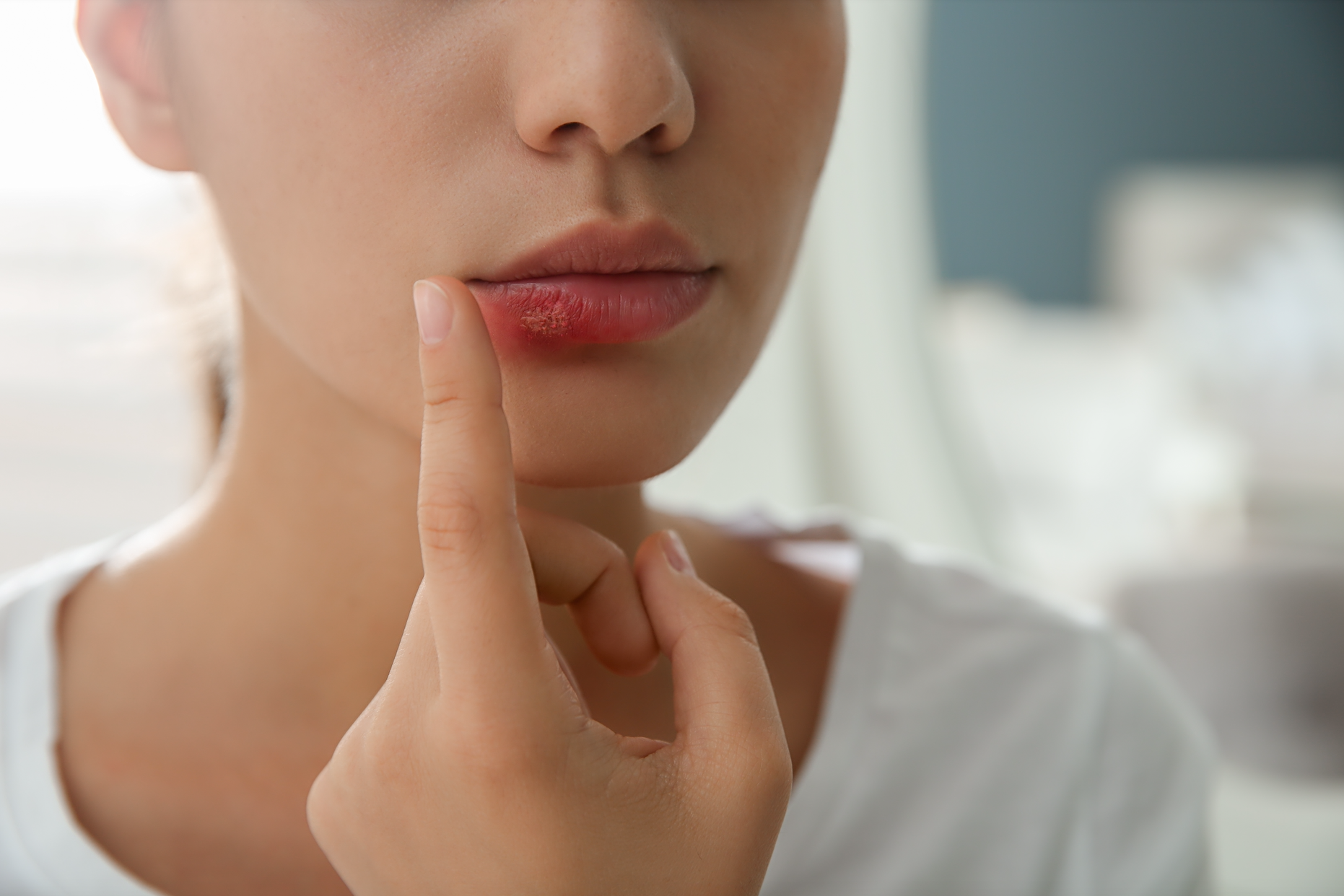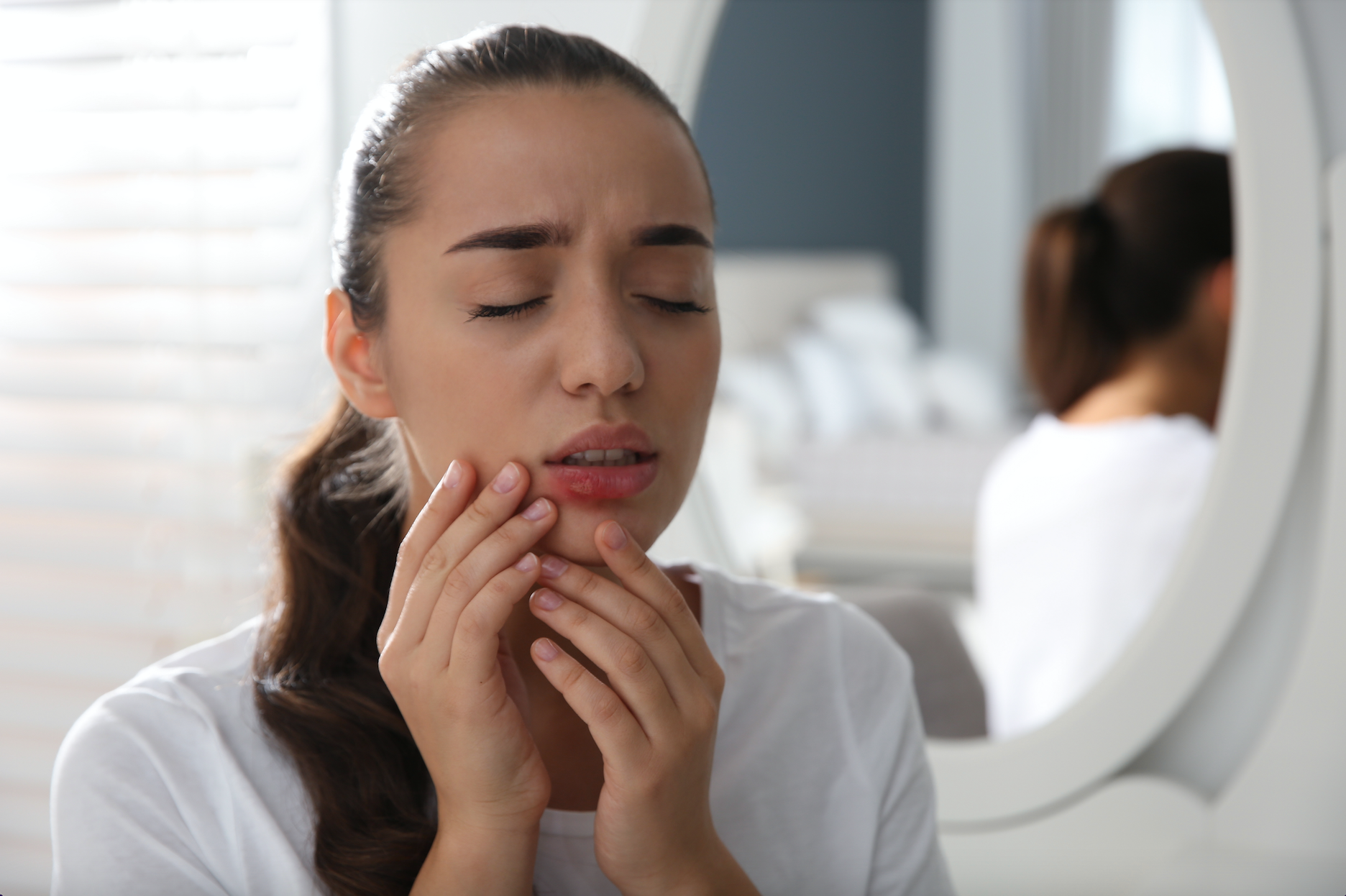Cold Sores
About Cold Sores -
What is it?
Cold sores, popularly known as “cold sores”, are a viral infection caused mainly by the herpes simplex virus type 1 (HSV-1). This condition manifests itself in the form of small painful blisters containing fluid (vesicles), which usually appear on the lips, around the mouth or even inside the oral cavity. The healing process takes place when the vesicles burst and turn into scabs. Although less common, HSV-2, more associated with genital herpes, can also cause lip lesions.

After the initial infection, the virus remains latent in the nerve ganglia and can be reactivated in situations of stress, low immunity, excessive sun exposure or hormonal changes. Cold sores are highly contagious, especially during the period when vesicles are present, and transmission occurs through direct contact with the lesions or by sharing contaminated objects such as glasses, cutlery or towels. It can also be transmitted by kissing or close contact during an active episode. It should be noted that transmission of this virus can occur even if the infected person has no symptoms. All it takes is contact with skin or an object contaminated by someone who has the virus for the disease to spread.
Possible Symptoms
The symptoms of cold sores vary from person to person and can be more severe in the first infection than in subsequent reactivations. The main signs and symptoms include:
Tingling and itching
Generally, the lesions begin with an itching, tingling or burning sensation in the affected area, signaling the start of a viral reactivation.
Appearance of vesicles
Small fluid-filled blisters appear on the lips or around the mouth. These blisters can cluster together and vary in size.
Pain and Sensitivity
The vesicles and surrounding areas can be painful, causing discomfort when chewing, speaking or even resting.
Vesicle rupture
The blisters can rupture, forming shallow, painful ulcers. These lesions often dry out, forming yellowish crusts before healing is complete.
Fever and malaise
In some cases, especially during primary infection, systemic symptoms such as fever, enlarged lymph nodes and a general feeling of tiredness can appear.
Treatment of Cold Sores
Although there is no definitive cure for cold sores, there are effective treatments to relieve symptoms, speed up healing and reduce the frequency of recurrences. Options include:
Local care:
Applying cold compresses to the affected area can help relieve pain and reduce swelling. Avoiding touching or handling the lesions minimizes the risk of secondary infection. Soothing products, such as aloe vera gel, can also be used.
Topical antivirals:
Certain antiviral ointments or creams can be applied directly to the lesions to help reduce pain, itching and healing time. This treatment works by inhibiting the spread of the virus.
Oral antivirals:
In more serious or recurrent cases, the doctor may also prescribe oral antiviral drugs. These drugs help control the proliferation of the virus and reduce recovery time.
Hygiene care:
Keeping the area clean and dry is essential to avoid complications. Washing your hands before and after touching the area is essential to prevent the virus from spreading to other parts of the body or to other people.
Immune support:
Strengthening the immune system with a balanced diet, adequate hydration and quality sleep can help reduce the frequency of flare-ups. Stress reduction practices such as meditation and physical exercise are also recommended.
Our Clinical Team is here to help you!
Agreements and Partnerships
FAQ's
1. Is cold sores contagious?
Yes, cold sores are highly contagious, especially during the vesicle phase. The virus can be transmitted by direct contact with the lesions or through contaminated objects such as cutlery, glasses or towels.
2. Is it possible to prevent cold sores?
Although it's not possible to completely avoid cold sores, measures such as avoiding contact with active lesions, using lip balm with sunscreen and keeping the immune system strong can help prevent reactivations.
3. How long does an episode of cold sores last?
The duration varies, but generally the symptoms disappear in 7 to 10 days. Treatment can shorten this period.
4. Can stress cause cold sores?
Yes, emotional or physical stress is one of the main triggers of a herpes outbreak. This is because stress weakens the immune system, making the body more susceptible to outbreaks of the virus.
5. Can lesions leave scars?
It's not common, but manipulated or infected lesions can lead to scarring.
6. Can I use make-up to disguise my lesions?
It is not recommended, as it can aggravate irritation and increase the risk of infection.
7. Can children get cold sores?
Yes, the virus can affect people of all ages. In children, the first infection may be more symptomatic. It should be noted that in some cases, herpes can be transmitted during vaginal delivery, if the mother is infected with the virus (vaginally) at the time of delivery. It is important to be aware that herpes labialis during pregnancy does not necessarily pass the virus on to the baby. However, if left untreated, it can pass into the vaginal region - causing genital herpes - which is particularly dangerous in newborns.
8. Is there a vaccine against cold sores?
There is currently no specific vaccine to prevent cold sores.
9. Is kissing someone with cold sores dangerous?
Yes, it's one of the most common ways of transmitting the virus.
10. What's the difference between cold sores and canker sores?
Canker sores are not caused by viruses and are not contagious, while cold sores have a viral origin and can be transmitted.
11. Can cold sores be transmitted even without visible symptoms?
Yes, even in the absence of symptoms, the virus can be transmitted, a phenomenon known as “asymptomatic transmission".
12. Can the use of lip protector prevent cold sores?
Yes, prolonged exposure to the sun, especially on the lips, can trigger outbreaks of cold sores, as it compromises the skin's immunity.
13. Can pregnant women treat cold sores?
Yes, in the special case of pregnancy, although cold sores do not pass on to the baby, it is essential to treat the infection as soon as the first symptoms appear, in order to prevent the virus from spreading to the vaginal area, causing genital herpes, which can be transmitted to the baby during childbirth and is particularly dangerous for newborns. The doctor will advise the safest medication to treat herpes during pregnancy.
14. Are immunosuppressed people more prone to cold sores?
Yes, individuals with compromised immunity are at greater risk of more frequent and severe reactivations.
15. Is it contraindicated to have dental treatment during an episode of cold sores?
The presence of fluid-filled vesicles poses a high risk of infection in other areas, such as the eye and intraoral area. This can happen because most dental procedures lead to the production of aerosols which can carry droplets that consequently transmit the virus. The safest course of action is always to postpone appointments until the lesions have completely healed.
Our Clinical Team is here to help you!







